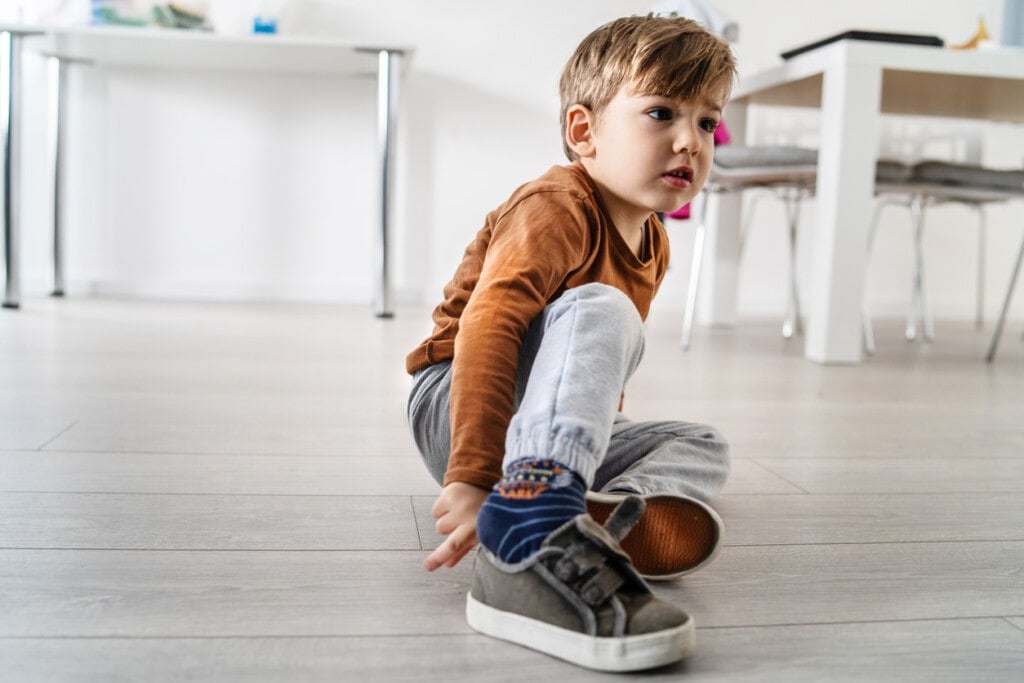There has been a lot of buzz in the last couple of years about “lazy parenting.” You may hear the term “lazy parent” and think of a mom lying around in her pajamas all day, drinking Diet Coke, and letting her kids run amok while she binges Netflix. That may sound like a dream life for some, but it isn’t realistic and certainly isn’t what lazy parenting is about. The term is a bit of a misnomer. Lazy parenting has nothing to do with being lazy; it describes more of a laid-back, free-range kind of parent. It’s the complete opposite of a helicopter mom. For many families, it’s a great way to live, and more people are adopting the lazy parenting way of life.
What Is Lazy Parenting?
The term “lazy parenting” has a negative connotation. It sounds negative! However, the lazy parenting style can have some positive outcomes. It takes a more hands-off approach and allows the child to experience life independently and face natural consequences for their actions and decisions. It could also be considered close to the “uninvolved” or free-range parenting styles, where children are allowed much more freedom to live their lives than in other parenting styles.1,2,4
This could look like a small child touching a thorn in a bush and learning on their own and through their action that it hurts. Or an older kid who doesn’t do their homework on time and must face their teacher at school without their parents sticking up for them. The approach allows a child to learn from their own experiences.1,4
Of course, it isn’t just about negative consequences. Good things come from allowing a child to have a bit more control over their decisions. They can develop better critical thinking skills and may become more independent.1,3 More autonomy over one’s self also leads to a boost in self-confidence and self-worth.1,3,5
Lazy Parents Can Raise Kids To Be Active Adults
There is nothing lazy about being a lazy parent. It’s quite the contrary. The effects of lazy parenting on a child lead them to be much more active individuals. Kids learn to be invested in themselves and their success and responsible for their failures. When they do something well, no matter how small, they can thank themselves for achieving it.3,5
It’s Not Easy for Every Parent To Be Lazy
Lazy parenting can be challenging for people who like to be in control. Think about watching a child make a sandwich for the first time. Wouldn’t it be easier to grab the peanut butter and jelly and put it together for them? It would take less time and be much cleaner, but your child wouldn’t learn to do things independently.
Lazy parenting means stepping back and letting our kids learn through trial and error and perfect their skills. It also means parents will watch their children fail. This can be frustrating for everyone. For instance, a child may have to settle for a lunch they may not love if they keep leaving their lunchbox at home. But eventually, they’ll learn to bring it with them. Older kids may end up in hot water for leaving their laptops at home, but they’ll remember once they understand it’s crucial to have their things together.
Set Reasonable Expectations of Your Family
If one parent is lazy and the other tends to be more overbearing and a helicopter, it may not work. It’s best if both parents take the hands-off approach, at least for a while. Additionally, kids need to know what their parents expect of them. They need to realize they are responsible for themselves; they will have to face the consequences if they do not take that responsibility.1 There will be no more mom or dad saving the day.
Lazy Parents Might Have Less Burnt Out
Another element of being a lazy parent is it takes the pressure off you. Instead of having to leap at a problem and solve it or be your child’s sole source of entertainment, you are giving yourself an opportunity for downtime. Of course, it’s all about balance (you don’t want to swing to the extreme and become uninvolved or a disengaged parent).
But there is no harm in being close to your child when they play without actively getting involved or letting them try and solve (non-urgent) situations without your input.6 Research indicates that parents who aren’t constantly pushing themselves to be perfect tend to be less burnt out. In the long run, this means they are better able to be present and engaged with their families.6
Kids Practice Imagination, Empathy, and Independence
There are some terrific benefits when moms and dads butt out of kids’ play and let them explore at their own pace. Children naturally learn and explore their world through play, so we stop these natural processes when we interfere too much.8 Kids need the chance to practice things like social situations, role-play (which builds empathy), different skills (physical skills, gross/fine motor skills, etc.), sharing and turn-taking, imagination, and pretend play.9
When we provide children with space and don’t hover too much, they can explore the world in a more meaningful way for them. They may also feel a sense of pride in being able to do things for themselves when we give them the space to figure things out. This gives them more freedom and a chance to practice independence.4,5,7
Lazy Families Become Productive
It may be worth giving lazy parenting a try at your house. Sure, it might be frustrating, but it can certainly be a growth experience for everyone in the house. Just because you didn’t start as a lazy parent doesn’t mean you can’t be one now. Kids are resilient, and they are fast learners. They may like a lazy parenting style better than a parent constantly breathing down their neck. This is particularly true of older kids and teenagers who want to earn a bit of independence.
A lazy parent may be tempted to jump in sometimes, which is okay. You certainly would want your toddler to refrain from burning themselves on a hot stove, and it’s not a bad idea to save your teen from being late for a final if their alarm doesn’t go off. We’re only human, after all. And we will always want the best for our kids and do everything possible to make it happen.
But if you want to be a lazy parent, as hard as it may be, resist the urge to toss those dirty socks in the laundry after you’ve asked your 10-year-old to throw them in the basket 20 times. You never know; a few days of stinky feet might be enough to make him do his laundry.
































